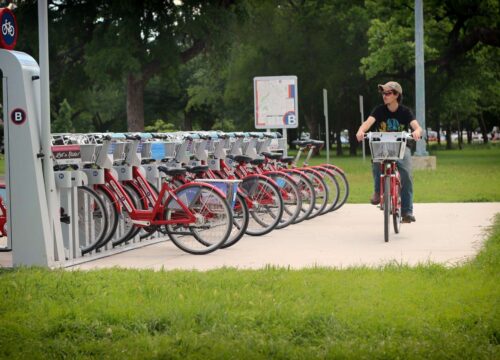The CFF is an MSP which facilitates access to finance for climate change mitigation and resilience projects in cities. It was founded in 2015 as a joint project of the C40 Cities Climate Leadership Group (C40) and the Deutsche Gesellschaft für Internationale Zusammenarbeit (GIZ) GmbH.
To set up one of CFFs first national clusters focused around public bike sharing systems, it is supporting the cities of Bogotá, Cali, Montería, and Bucaramanga in Colombia. By deploying at least 3,800 publicly accessible bicycles, there will not only be a reduction in the congestion throughout the city, road infrastructure costs, and greenhouse gas emissions. Other benefits include improved air quality, safer cities, and healthier citizens. The city is leading the project’s planning and implementation, while the CFF is currently providing the following support:
- Dedicated technical advisor based within the city administration
- Support on capacity development regarding managing Public Bikeshare Systems and financially structuring projects
- Support the development of contractual and legal frameworks including contract models for PPP options and tender documents
- Legal and institutional analysis
- System planning and regulation
The skills developed during this process will make it easier for Colombian cities to prepare and deliver future sustainable infrastructure projects.
CFF is also supporting the development of Bogotá’s first resilient cycle highway. Traversing the city from north to south, this 25 km-long cycle highway will connect citizens from low, middle, and high-income neighbourhoods with jobs, schools, and recreational opportunities, and will support approximately 42,000 bicycle daily trips. The project will include bicycle parking facilities, advance measures to enhance the security of vulnerable users (such as adequate street lighting) and promote economic development (e.g. improvement of public spaces along the route).
In Sierra Leone, the city of Freetown is working in partnership with the CFF to develop its first cable car project, with four stations, a total length of 3.6 km, and the capacity to serve 6,000 people per hour in both directions. This will not only relieve the burden on the informal public transport sector, but also allow under-served hillside communities access to the central business district through quick, safe, and inexpensive public transport.
The effects of sustainable public transport on entire cities and communities are vast. MSPs such as the CFF can bundle resources effectively to provide a variety of services to realise climate change mitigation and resilience projects in cities around the world.
Another MSP working in the field of sustainable urban mobility planning, policy development, and increasing investment for sustainable transport in developing and emerging economies is the MobiliseYourCity Partnership. Find more information here.



